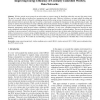Free Online Productivity Tools
i2Speak
i2Symbol
i2OCR
iTex2Img
iWeb2Print
iWeb2Shot
i2Type
iPdf2Split
iPdf2Merge
i2Bopomofo
i2Arabic
i2Style
i2Image
i2PDF
iLatex2Rtf
Sci2ools
118
click to vote
WINET
2002
2002
Improving Energy Efficiency of Centrally Controlled Wireless Data Networks
Wireless network access protocols can assist nodes to conserve energy by identifying when they can enter low energy states. The goal is to put all nodes not involved in a transmission into the doze state. However, in doing so, one must tradeoff the energy and other costs associated with the overhead of coordinating dozing with the energy savings of putting nodes to sleep. In this paper, we define three alternative directory protocols that may be used by a central node to coordinate the transmission of data and the dozing of nodes. We attempt to optimize their performance by using scheduling and protocol parameter tuning. In addition, we consider the impact of errors and error recovery methods on energy consumption. Although one can argue that carefully scheduling transmissions will improve performance, ultimately, appropriately tuning protocols reduces scheduling's significance. In most cases, scheduling transmissions between the same nodes contiguously and ordering such transmiss...
Related Content
| Added | 23 Dec 2010 |
| Updated | 23 Dec 2010 |
| Type | Journal |
| Year | 2002 |
| Where | WINET |
| Authors | John A. Stine, Gustavo de Veciana |
Comments (0)

